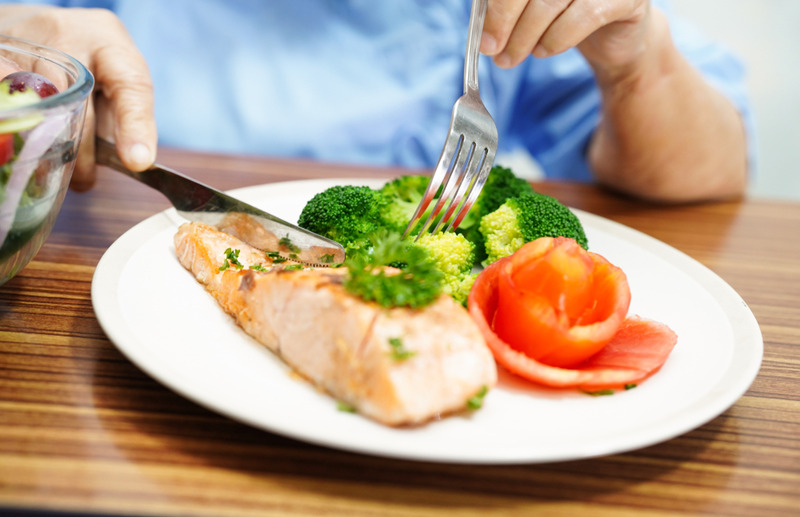Waking up on a Sunday morning or going about your daily activities, suddenly, your skin starts feeling hotter than a barbecue grill on the Fourth of July. Sweating breaks out, and your skin turns red. This is a common symptom of menopause. Hot flashes and night sweats sometimes called vasomotor symptoms (VMS), can occur intensely during menopause.
Hot flashes are not only uncomfortable, but they can be embarrassing, too. While hormonal replacement therapies and other lifestyle changes can help to reduce menopausal symptoms, several foods can dramatically reduce annoying hot flashes.
Experts suggest the best 9 foods that fight hot flashes. Soy foods, fruits, vegetables, water, cooling foods, and phytoestrogen-rich foods are the best food choices that stop hot flashes. Read on for more information on the foods that help stop hot flashes and those you should avoid.
Before jumping to food choices, we will see what are menopausal hot flashes and why they occur.
Why do menopausal hot flashes occur?
Hot flashes are the sudden feelings of heat, flush, and sweat in the upper body. They mainly spread via the face, neck, and chest. Hot flashes are a common symptom of menopausal changes and can last for many years. Hot flashes are called night sweats when they occur at night.
Up to 85 percent of women report menopausal hot flashes. According to the North American Menopause Society (NAMS), around 75% of perimenopausal women are affected by hot flashes and night sweats in the United States.
A study conducted at the North American Menopause Society Conference in 2022 showed that both hot flashes and night sweats are different VMS responses to menopause. They can cause heart palpitations, fatigue, anxiety, dyspnea, vaginal dryness, and some confusion. Both may disturb sleep, but night sweats are more stressful and long-lasting.
Experts suggest that the menopausal transition comes with a hormonal imbalance. Cleveland Clinic says at the beginning of the menopausal transition, your body’s ability to regulate its core temperature is hampered because of drastic fluctuations in your estrogen levels. Your estrogen and progesterone levels drop drastically. Ultimately, this hormonal fluctuation alters how your brain perceives your body temperature. That aggravates hot flashes.
According to Elaine Stern, a specialist in Chinese medicine and clinical nutrition, being hungry can also trigger a hot flash. She says, “Don’t let yourself get too hungry because hunger causes your blood sugar drop and your adrenaline level to spike. This condition leads to hot flashes.”
However, these vasomotor symptoms can be significantly reduced with healthy food choices.
9 foods that fight hot flashes and night sweats
Here are 9 foods that fight hot flashes and night sweats. If you don’t want to modify your diet entirely, try to add the following 9 foods to your diet.
Soy foods
Soy foods contain genistein and daidzen that effectively balance hormone levels. Isoflavone — a type of phytoestrogen, is plentiful in soy and helps to control hot flashes. Studies show that a low-fat vegan diet and soy-rich foods decrease 79 percent of postmenopausal hot flashes and night sweats. Daily intake of soy products dramatically reduces the intensity of hot flashes and their symptoms.
It’s better to use minimally processed soy foods because they contain healthier vitamins and minerals.
Consider the following.
- Tofu
- Miso
- Soybeans
- Edamame
- Soy milk
- Soy nuts
Foods rich in phytoestrogen
A plant-based diet is a good source of estrogen-like compounds. Eating other phytoestrogen-rich foods could effectively manage vasomotor symptoms.
Phytoestrogen (almost a medicinal food) is an estrogen-like compound derived from plants. It mimics and combines with estrogen receptors to balance hormone levels. Foods with high phytoestrogen content and low fat content can also lower the risk of menopausal weight gain.
Consider the following phytoestrogen-rich foods.
- Celery
- Carrots
- Chia seeds
- Green beans
- Wheat germ
- Apples
- Sesame seeds
- Lentils
- Alfalfa
Fruits and vegetables
The better your diet is, the more fruits and veggies you can add. Vegetables reduced oil consumption. A study found that increased intake of fruit and vegetables reduces vasomotor symptoms, including hot flashes and night sweats in postmenopausal women.
Fruits and vegetables provide endless options. Try to have a Mediterranean-style diet like:
- Broccoli
- Legumes
- Spinach
- Kale
- Berries
- Beet greens
- Brussels sprouts
- Olive oil
- Zucchini
- Collard greens
- Asparagus
Vitamin E rich-foods:
Studies suggest foods rich in vitamin E are the best diet choices among the foods that fight hot flashes. That reason is that vitamin E decreases menopausal weight gain in addition to reducing depression and hot flashes. So, while making dietary modifications, you must choose vitamin E-rich foods.
Try the following healthful foods for a well-balanced diet:
- Avocado
- Asparagus
- Almonds
- Peanuts
- Red bell pepper
- Soybean oils
- Sunflower seeds
- Seafoods
Healthy Fats:
Foods rich in omega-3 fatty acids, such as fatty fish, contain anti-inflammatory properties. Omega-3 fatty acids help alleviate hot flashes and night sweats. These good fats also protect menopausal women from other health conditions affecting the coronary blood arteries. One study found that foods with polyunsaturated fatty acids help lower the risk of heart disease.
Following are examples of healthy fatty foods that fight hot flashes.
- Salmon
- Tuna
- Mackerel
- Sardines
- Chia seeds
- Flaxseeds
- Cereals
Vitamin C & bioflavonoids
Women’s health experts recommend that daily intake of vitamin C and bioflavonoids can significantly help with hot flashes.
Citrus fruits such as lemons, limes, oranges, cherries, and grapes are a great source of vitamin C and bioflavonoids.
Additionally, try to eat vitamins B6 and B12, which may stop hot flashes and manage stress and insomnia.
Protein-rich Diet:
Maintaining your muscle mass is also crucial while fighting hot flashes. Eat protein-rich foods such as fish, poultry, and meat. Tofu, lentils, quinoa, chickpeas, yogurt, and chia are excellent vegan protein sources for vegetarians.
8 ounces of Greek yogurt provides 12g of protein. Yogurt can help maintain bone mass and alleviate menopausal symptoms, including mood swings and hot flashes. It also controls blood sugar levels and appetite and boosts healthy cholesterol levels.
Also Read: Glutney: An Easy And Healthy Vegan Recipe
Cooling Foods:
According to traditional Chinese medicine, a mix of cooling foods and herbal treatments can keep your body temperature. According to Chinese medicine, green tea and eggs may help you cool down. With their cooling properties, these cooling foods keep electrolytes in balance.
The following cooling foods can alleviate hot flashes.
- Bok choy
- Cauliflower
- Cucumber
- Cabbage
- Radish
- Bananas
- Pears
Water:
It’s important to recall that drinking cold water helps regulate menopausal hormone transitions. Drink 8 to 12 glasses of water daily; it will help you stay hydrated and prevent bloating.
Consider some other drinks such as buttermilk, kokum juice, coconut milk, soya, and diced apple. Because of cooling effects, all these drinks help you regulate body temperature.
Thus, these are 9 foods that fight hot flashes and night sweats and help alleviate other vasomotor symptoms.
Foods that cause hot flashes
Hot beverages, alcohol, caffeinated drinks, chilis, and other spicy foods trigger hot flashes. Pasta, potatoes, white rice, and other white crabs are associated with spikes in blood sugar, elevated hot flashes, and insulin resistance. It is believed that sugar and chocolates can increase the body temperature to the point where the body system overreacts and causes sudden heat, sweat, and flashes.
These foods also increase the intensity of additional menopause symptoms like depression, mood swings loss of libido, and sleep disturbances.
Other lifestyle modifications
Here are some other lifestyle modifications that help you cure hot flashes naturally.
- Dress in layers
- Use a portable fan when hot flashes hit
- Your daily diet should be hot flash-friendly
- Try to manage your weight
- Stop smoking
- Exercise regularly
- Get plenty of sleep
- Try to keep cool
- Practice yoga and meditation
- Don’t be stress
Takeaway
Premenopausal to menopausal transition can be a challenge in itself, and hot flashes contribute to it more. If you are suffering from menopausal hot flashes, the foods that you eat can affect them. Instead of processed foods, eat soy, vegetables, phytoestrogen-rich foods, and cooling foods that not only can reduce the frequency and intensity of hot flashes but also stop the risk of reporting VMSs.


